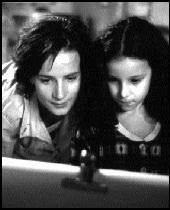AMY
directed by Nadia Tass with Rachel Griffiths and Alana De Roma runs Dec. 14-20 at Broadway Market
ALTHOUGH SHE LOOKS disturbingly like that awful little girl from the Pepsi commercials, Amy (Alana De Roma) isn’t singing the gospel of cola. She’s deaf and mute for unknown reasons, although the muteness, it turns out, we should be grateful for. Her rock-star father (Nick Barker) is mysteriously M.I.A. (except in extremely long flashbacks), and the Australian version of Child Protective Services is after her mom (Rachel Griffiths, Oscar-nominated for Hilary and Jackie) for not putting her in a special school.
Mother and daughter flee their outback ranch for the big city, ditching a grandpa so heartlessly that he never even turns up in the movie again. They move into a crummy little house on a crummy little street in a crummy Melbourne neighborhood, where the neighbors are dolts and louts and drunks. Can a mute little girl bring out the wondrous humanity at their—and by the associative property, all the world’s—core? Can they, in turn, help her to become whole again? Is the suspense killing you?
The recipient of a slew of international indie film fest awards, the 1998 Amy actually has a fair amount of charm. Griffiths is sexily disheveled and fed up with the system that insists on helping her daughter via institutionalization; her frustration and desperation lead her to some poor decision making, as when she brandishes a pitchfork at two social workers out on the ranch. (Ah, the menacing of the social workers; will it never go stale?) The gritty neighbors, while running the gamut of stereotypes, are somewhat fun to watch: the crotchety old lady eternally hosing down her sidewalk; the two idiots eternally working on their cars; the nice-if-white-trash lady and her eternally inebriated, abusive husband and nice-if-white-trash son. De Roma is serviceable for a first-time child actor who mainly has to look pallid and not say anything. Robert (Ben Mendelsohn) is the cute guy next door who plays the guitar, just like Daddy used to.
So the film is sucked into a vortex of seemingly inevitable mediocrity. As the twin mysteries of Amy’s disability and Dad’s absence are drawn out, some highly melodramatic plot twists are thrown in to keep the whole thing trundling along. Goofy montages and long patches of terrible indie-rockin’ soundtrack are also deployed, as both Amy and Amy descend into a maudlin ending that’s just embarrassing.








